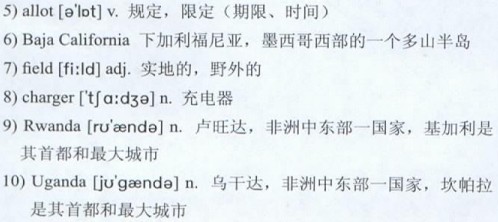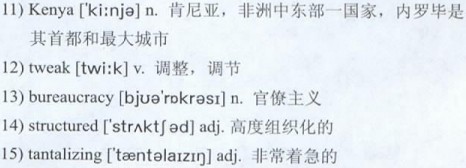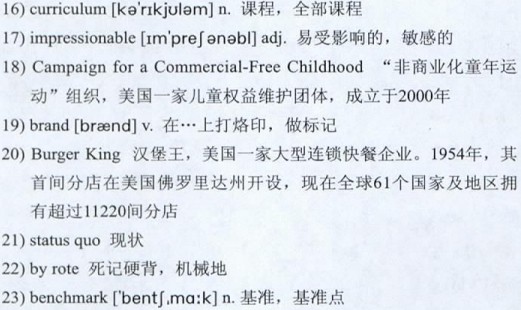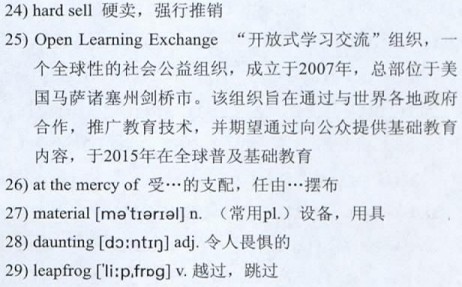文字难度:★★★
When I walk into the first-grade classroom at Henry Clay Elementary School on Chicago’s South side, the lights are off and the room is silent. Three-quarters of the 20 children are 1)plugged into headphones, staring into little blue machines. The TeacherMate, as it is called, is a handheld computer with a four-hour battery life. It runs full-color Flash games on a platform partly open to volunteer developers worldwide, and it can record and play back audio. Julissa shyly tells me that she likes this device. “They have lots of games,” she says. “I like the fireman game,” where exciting music plays as you choose the right length ladder, which sneakily teaches simple 2)addition and 3)subtraction.
当我走进芝加哥南部亨利·克莱小学一年级某个班级的教室时,里面的灯都关着,一片寂静。里面的20个孩子中有四分之三的孩子都戴着耳机,目不转睛地盯着眼前小小的蓝色机器。那就是所谓的“教师助手”,一种手持电脑,其电池可供电4小时。机器里运行着全彩色的Flash游戏,该游戏的部分开发平台向全球志愿开发者开放,它可以录制和播放音频文件。班上的学生茱丽莎羞怯地告诉我,她喜欢这个设备。“里面有很多游戏,”她说,“我喜欢那个消防员游戏。”玩消防员游戏时,当你选对长度合适的梯子时,就会有激昂的乐声响起来,在这个过程中,孩子们不知不觉地学习到简单的加法和减法。
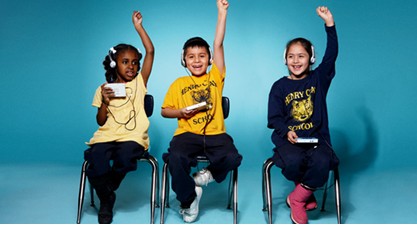
Julissa’s teacher Kelly Flowers explains that the software on her laptop lets her track each student’s performance. Once a week, when she plugs each student’s TeacherMate into her 4)docking station, she downloads a record of their game play and generates reports for herself as well as for parents. Then she sets the precise skills, levels, and5)allotted time for the upcoming week. Flowers says the kids like the TeacherMate because it gives them a feeling of freedom. “It doesn’t feel like homework,” she says. “They can choose from a whole list of games. They don’t know that I’ve decided what skills they’ll be working on.” And during the time her class spends with TeacherMates each day, Flowers can devote more focused time and attention to small groups of students.
茱丽莎的老师凯莉·弗拉沃斯说,她的手提电脑上装了一种软件,可以追踪每个学生做游戏的情况。每周一次,她通过扩展坞把学生们的“教师助手”连接到自己的电脑上,下载他们的游戏记录,将其写成一份报告,供自己和家长们参考。然后她会设定下一周游戏的技能要求、游戏级别和时间限定。弗拉沃斯说,孩子们之所以喜欢“教师助手”是因为他们从中体验到了一种自由感。“这不像一般的家庭作业,”她说,“他们可以从一系列游戏中自行选择。他们不知道自己将要挑战的那些游戏的技能要求是由我决定的。”每天当班上的孩子玩着“教师助手”时,弗拉沃斯可以把更多的时间和精力用于对学生分组辅导。
Late on Thanksgiving night, I’m in a van bumping over gravel roads in 6)Baja California, Mexico, with Paul Kim, the chief technology officer of Stanford University’s School of Education; a 7)field team of four students; and two boxes of TeacherMates. Kim is devoted to using cell phones to provide poor children with the basics of education and with access to all of the world’s information. “Kids love stories,” he says. “In places with no TV, no Internet, no books, when they are given these devices, these are like gifts from heaven.” He has long dreamed of a machine that is cheap, powered with a solar8)charger, and equipped with game-based learning content—a complete “Pocket School.” For the past four years, he has been testing phones from a dozen different manufacturers, but the TeacherMate, which he discovered in March 2008, comes closer than anything to the Pocket School-ideal.
感恩节深夜,我坐着一辆小面包车颠簸在墨西哥下加利福尼亚州的一条碎石路上。和我同行的是斯坦福大学教育学院的技术总监保 罗·吉姆,此外还有4名去进行实地考察的学生和两箱“教师助手”。吉姆致力于通过手机向贫苦儿童提供基础教育知识,让他们接触到世界的各种信息。“孩子们喜欢故事,”他说,“在没有电视、网络和书本的地方,这些设备对于他们而言就像从天上掉下来的礼物。”他一直梦想着能有一种价格便宜、用太阳能充电的设备,配上以游戏方式呈现的学习内容——一所完备的“口袋学校”。过去4年来,他测试了十几家不同制造商生产的手机,在2008年3月发现了“教师助手”,认为它最接近自己“口袋学校”的理想。
The Mexico trip is one of a whirlwind of small user-testing and demonstration projects that Kim has undertaken in the past 12 months. He has personally brought TeacherMates to 9)Rwanda,10)Uganda, 11)Kenya, and several sites in Mexico, in most cases working with local not-for-profits, trying them out for a few hours and on a few dozen children at a time. He brings along programmers, so they can get feedback and 12)tweak the software accordingly. In Baja, I watch children aged 6 to 12 pick the machine up and within a few minutes, with no direct instructions, they’re working in groups of three, helping one another figure out the menus in English by trial and error, playing the same math games as the students in Chicago, and reading along with stories in Spanish. The children agree that the TeacherMates are “cute.”
过去12个月来,吉姆到处进行“教师助手”的小规模用户测试和演示项目,墨西哥是其中一站。他个人出资购买了“教师助手”带到卢旺达、乌干达、肯尼亚和墨西哥的一些地方。大部分情况下,他和当地的非营利性组织合作,每次选取几十名孩子进行几个小时的测试。他会带上一些程序员,以便他们能及时获取反馈,对软件进行相应的修改。在下加利福尼亚州,我看到6岁到12岁的孩子们拿起那些机器,几分钟内,在没人直接指导的情况下,他们三个人一组,互相帮忙,连猜带蒙弄懂了那些英文菜单是什么意思,和芝加哥的孩子们一样玩着数学游戏,读着西班牙语故事。孩子们一致认为,“教师助手”非常“可爱”。
Kim focuses overwhelmingly on empowering kids to teach themselves. He sees technology as a liberating force, helping kids in rich and poor countries alike bypass schools, with all their waste, 13)bureaucracy, and failures, entirely. “Why does education need to be so 14)structured? What are we so afraid of?” he asks. “That’s a phenomenon I’ve found even in Rwanda—where only 1% have electricity. With these devices, what the kids pick up in two minutes, the teachers need two hours to teach. The kids explore by themselves and figure it out. When you work with those kids directly, no matter where they are, they’re so innovative.”
吉姆全力聚焦于培养孩子们的自学能力。他视技术为一种解放性力量,无论是穷国家的孩子还是富国家的孩子,都可以借助它避开学校和现行教育体制的浪费、官僚主义及种种弊病。“教育为什么要如此高度组织化?我们到底在害怕什么?”他问道,“甚至在只有1%的地方通了电的卢旺达我都发现了这种现象。老师原本得花两个小时去教的东西,用这些设备,孩子们两分钟就能学会。他们自己探索,自己就弄懂了。只要你亲身接触过那些孩子,就会发现,他们不管来自哪里,都极具创造力。”
Mobile phones have transformed communications, especially in the developing world, more swiftly than anyone could have imagined. The prospect of doing the same for education—putting best-of-breed learning software in kids’ hands anytime, anywhere—is 15)tantalizing. Yet not everyone is so excited about what might be called the iTeach future.
手机已经改变了沟通方式,尤其是在发展中国家,其速度比任何人能够想象的更快。人们翘首企盼它能为教育领域带来同样深刻的变革——随时随地将最好的学习软件送到孩子们手中。然而面对那可能被称为“借助高科技移动教学设备自学”的未来,并不是每个人都如此激动不已。
While a $100 16)curriculum-in-a-box may seem like a good value even by developing-country standards, wide distribution would still be costly. And there’s worry that wide adoption of mobile technologies for learning will give marketers direct access to a very 17)impressionable demographic. “Cell phones are increasingly a way for advertisers to target children,” says Josh Golin of the 18)Campaign for a Commercial-Free Childhood. “We’ve seen19)branded 20)Burger King games downloaded to cell phones and text-message advertising sent to kids.”
即便按发展中国家的标准,这么一部课程学习机卖100美元似乎也挺公道的,但要全面推广仍需大量的投入。此外,人们担心移动技术广泛进入教学领域会使得市场推销者可以更直接地左右心智仍未成熟的青少年人群。“手机正日益成为广告商‘轰炸’孩子的一种工具,”来自“非商业化童年运动”组织的乔希·戈林说,“我们可以看到打着汉堡王广告的游戏被下载到手机中,还有人向孩子们发送广告短信。”
But the biggest challenge to Pocket School-style learning may not be the business model. The same possibilities that make these technologies so exciting—children pushing the buttons, controlling their own learning, and their own destiny—make them threatening to the educational 21)status quo. A system built around tools that allow children to explore and figure things out for themselves would be radical for most developing-world schools, which emphasize learning 22)by rote. In the United States, which is currently in love with state curriculum23)benchmarks and standardized tests, it could be just as a 24)hard sell.
但是“口袋学校”这一学习模式所面临的最大挑战可能不是其商业模式问题。令这些技术振奋人心的创意优势——孩子们按动按钮,自主掌控学习进程和自己的命运——对现行的教育模式体制却构成了威胁。对大多数向来强调死记硬背的发展中国家的学校来说,一个集合各种工具让孩子们自己探索和理解知识的体系过于激进。在目前热衷于统一的国家课程标准和标准化测试的美国,推广“口袋学校”可能有如强行推销。
What’s at issue is a deep cultural shift, a fundamental rethinking not only of how education is delivered but also of what “education” means. The very word comes from the Latin duco, meaning “to lead or command”—putting the learner in the passive position. Rabi Kamacharya, the founder of the 25)Open Learning Exchange (OLE) Nepal, talks about technology putting “children in the driver’s seat” to overcome the limited skills of teachers: “Even in urban areas, teachers who teach English, for example, do not know English very well. Children are 26)at the mercy of the teachers, who may not be motivated or have sufficient27)materials to work with. We want to enable them to go forward with self-learning and assessment.”
争论的核心是一场深刻的文化变革,一种根本反思——不仅涉及到应该如何教育孩子,还涉及到“教育”本身的含义。“教育”这个词来自拉丁语“duco”,意为“引导或命令”——把学习者放在被动的位置上。尼泊尔的“开放式学习交流”组织创建人拉比·卡玛查亚认为,移动教学技术将“孩子放到了‘驾驶席’上”使他们可以超越老师的水平局限:“比如说,即使是在尼泊尔的城市地区,教英语的老师也不是很懂英语。孩子们往往受制于那些或无心教学或缺乏足够教学设备的老师。我们希望能促使孩子们自学及进行自我评估。”
The challenge of putting such ideas into practice—and getting the kids into the educational driver’s seat—is so 28)daunting it’s almost laughable. Still, when you’ve seen a tiny child eagerly embracing a device that lets her write, draw, figure out math, and eventually find an answer to any question she might ask, it’s hard not to feel the excitement of the moment, or its revolutionary potential. We’re talking about 29)leapfrogging over massive infrastructure limitations to unleash what Kim calls “the only real renewable resource”—the inventive spark of 1 billion children.
让孩子坐到教育的“驾驶席”上,把这一理念付诸实践是个十分巨大的挑战,甚至有人会觉得可笑。然而,这样的一个设备能让孩子书写、绘画、解答数学题,并最终为她可能提出的种种问题找到答案,当你看见一个小孩对它爱不释手,你难免会激动,也无法否认其具备的变革潜力。我们谈论的是跨越教育基础设施的巨大局限,释放出吉姆所谓的“唯一真正的可再生资源”——10亿孩子的创造力。


